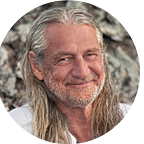The Breath is the Guru of your Yoga Practice. Obey Your Guru!
Mark Whitwell | Heart of Yoga
Whole-body participation in the breath is the central feature and purpose of asana in the harmony of the inhalation merging with the exhalation… strength that is entirely receptive, perfect participation in the power of Life.
Krishnamacharya would say “the breath is your gauge, the guru of your asana. Obey your guru!” That is the number of breaths and the breath ratio you can do without struggle.
When you link the breath to the whole body the mind automatically follows the breath. The mind links to the whole body, which is the power and intelligence of Life. The intelligence of Life therefore comes into the mind. Thinking becomes clear and useful. Mind links to its source, life itself… specifically to the hridaya Heart, where inhalation meets exhalation, the place of perfect giving and receiving, the nurturing power of Life that flows through and forms the whole body. Hridaya Heart is the seat of mind, from where the mind arises. Mind is a function of Life and truly has no function or existence without Life. Mind is a beautiful part of the beauty of Life and has no problem. Imagining that mind has an existence of its own, thinking and assuming separation from its source is like seeing a mirage. It seems to be there. But it’s not really there. Asana rightly practiced dissolves the mirage and places mind where it belongs, the communication mechanism of the heart which is the whole body. This is the beauty and power of your asana, which results in meditation, clarity of mind arising spontaneously and naturally without struggle. Do your Yoga as inhalation exhalation, as strength that is utterly receptive. Don’t compromise this technology of asana from the Wisdom Traditions.
So, how do we measure a student’s yoga practice?
Like Olga’s dog Kali in the picture above, in a profound updog! No struggle, equanimity in the natural state. What does ‘being good at yoga’ even mean?
What if it’s not how long you canhold a handstand…
Or how deep your forward bend is…
Or if you can balance on one arm…
Or if you can power through 108 sun salutations without breaking a sweat…
Or how tight your ‘yoga body’ is…
Or if you can sit doing nothing for hours at a time…
Or if you can see pretty blue flashing lights above your crown….
Not even if you can manufacture bliss-states from time to time.
What if a person’s yoga practice is measured in how good a listener they become…
In a lessening of reactivity to other people’s bullshit…
In their ability to see the best in others and love it… even the most annoying people…
In their kindness…
In their capacity for sincerity…
In their naturally reduced need for stimulating pleasures that were adopted to compensate for the eclipsed pleasures of breath and being…
In an ability to say things clearly without fear of what people will think…
In their perspective on the world.
If this stuff isn’t developing naturally — not as a fake performance — then it could be that our yoga isn’t actually yoga, is not giving us the full potential of practice.
Real yoga is about clarity of mind and perception, by linking the dissociative and solipsistic brain back up with the whole body, which is already nature, the power of life.
And it does matter, not just as pedantry, because we urgently need more love and less reactivity, and more clarity and less consumerism. The universal means of transmission of all wisdom traditions is the mutual affection between two actual people. Yoga is not knowledge or technique that you do on yourself to make you feel better. Yoga is actual relationship with an actual person who you love and who loves you. This is the heart of yoga. Practice of yoga is what you do in response to having such relationship. Such a love is like the sun. There is plenty of light for everyone. We don’t have to develop our relationship to the sun. It is always already given. We just enjoy it. We have it. No process is required.
About the Author:
Mark Whitwell is interested in developing an authentic yoga practice for the individual, based on the teachings of T. Krishnamacharya (1888–1989). He is the author of four books including ‘Yoga of Heart’ and ‘The Promise’ and was the editor and contributor to TKV Desikachar’s classic yoga text ‘The Heart of Yoga.’ Mark Whitwell continues to facilitate teacher trainings and workshops in the heart of yoga all over the globe.
Read More :
